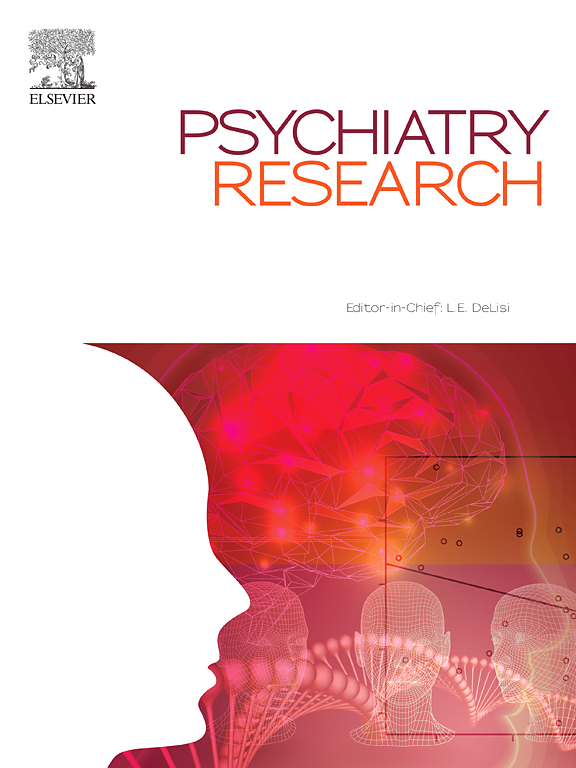精神障碍中的SARS-CoV-2感染和COVID-19结果以及性别的作用:来自加泰罗尼亚的一项基于登记册的研究
IF 4.2
2区 医学
Q1 PSYCHIATRY
引用次数: 0
摘要
前言:本研究调查了不同心理健康诊断中SARS-CoV-2感染风险和严重COVID-19结局的关系,以及性别在这些关联中的作用。方法:使用来自加泰罗尼亚的电子记录,我们确定了2017-2019年接受精神卫生保健的成年人,诊断为非情感性精神病(NAP)、双相情感障碍(BD)、抑郁症(DEP)、压力相关障碍、神经症/躯体形式障碍(NSD)和物质滥用(SUB)(暴露)。评估的结果是与没有这些精神障碍的匹配个体(未暴露)相比,SARS-CoV-2感染、COVID-19住院和COVID-19相关死亡。进行调整后的logistic回归分析。结果:纳入785,378名成人(70.3% < 65岁;57.1%的女性)。与未暴露者相比,NAP、BD、DEP和SUB患者感染SARS-CoV-2的风险较低,而NSD患者的风险较高。DEP、NSD和SUB感染者住院的风险较低,但与covid -19相关的死亡风险较高。NAP和BD患者的covid -19相关死亡率也较高。性别分层分析显示,患有NSD的女性特别容易受到感染,而患有DEP和NSD的女性与covid -19相关死亡的风险更高。结论:这些发现强调,在考虑性别差异的同时,需要制定量身定制的公共卫生策略,以降低某些精神障碍患者的超额死亡风险。本文章由计算机程序翻译,如有差异,请以英文原文为准。
SARS-CoV-2 infection and COVID-19 outcomes across mental disorders and the role of sex: A register-based study from Catalonia
Introduction
This study investigated the risk of SARS-CoV-2 infection and severe COVID-19 outcomes among different mental health diagnoses and the role of sex in these associations.
Methods
Using electronic records from Catalonia, we identified adults receiving mental health care from 2017–2019 with diagnoses of non-affective psychosis (NAP), bipolar disorder (BD), depressive disorder (DEP), stress-related disorders, neurotic/somatoform disorders (NSD), and substance misuse (SUB) (exposed). The outcomes assessed were SARS-CoV-2 infection, COVID-19 hospitalization, and COVID-19-related death, compared to matched individuals without these mental disorders (unexposed). Adjusted logistic regression analyses were conducted.
Results
785,378 adults were included (70.3% < 65 years old; 57.1% women). Compared to unexposed, those with NAP, BD, DEP, and SUB had a lower risk of SARS-CoV-2 infection, while those with NSD had an increased risk. Infected individuals with DEP, NSD, and SUB had a lower risk of hospitalization but a higher risk of COVID-19-related death. Higher COVID-19-related death was also observed in individuals with NAP and BD. Sex-stratified analysis revealed that women with NSD were especially vulnerable to infection, and women with DEP and NSD had a higher risk of COVID-19-related death.
Conclusions
These findings emphasize the need for tailored public health strategies to reduce excess mortality risk among individuals with certain mental disorders, while accounting for sex differences.
求助全文
通过发布文献求助,成功后即可免费获取论文全文。
去求助
来源期刊

Psychiatry Research
医学-精神病学
CiteScore
17.40
自引率
1.80%
发文量
527
审稿时长
57 days
期刊介绍:
Psychiatry Research offers swift publication of comprehensive research reports and reviews within the field of psychiatry.
The scope of the journal encompasses:
Biochemical, physiological, neuroanatomic, genetic, neurocognitive, and psychosocial determinants of psychiatric disorders.
Diagnostic assessments of psychiatric disorders.
Evaluations that pursue hypotheses about the cause or causes of psychiatric diseases.
Evaluations of pharmacologic and non-pharmacologic psychiatric treatments.
Basic neuroscience studies related to animal or neurochemical models for psychiatric disorders.
Methodological advances, such as instrumentation, clinical scales, and assays directly applicable to psychiatric research.
 求助内容:
求助内容: 应助结果提醒方式:
应助结果提醒方式:


